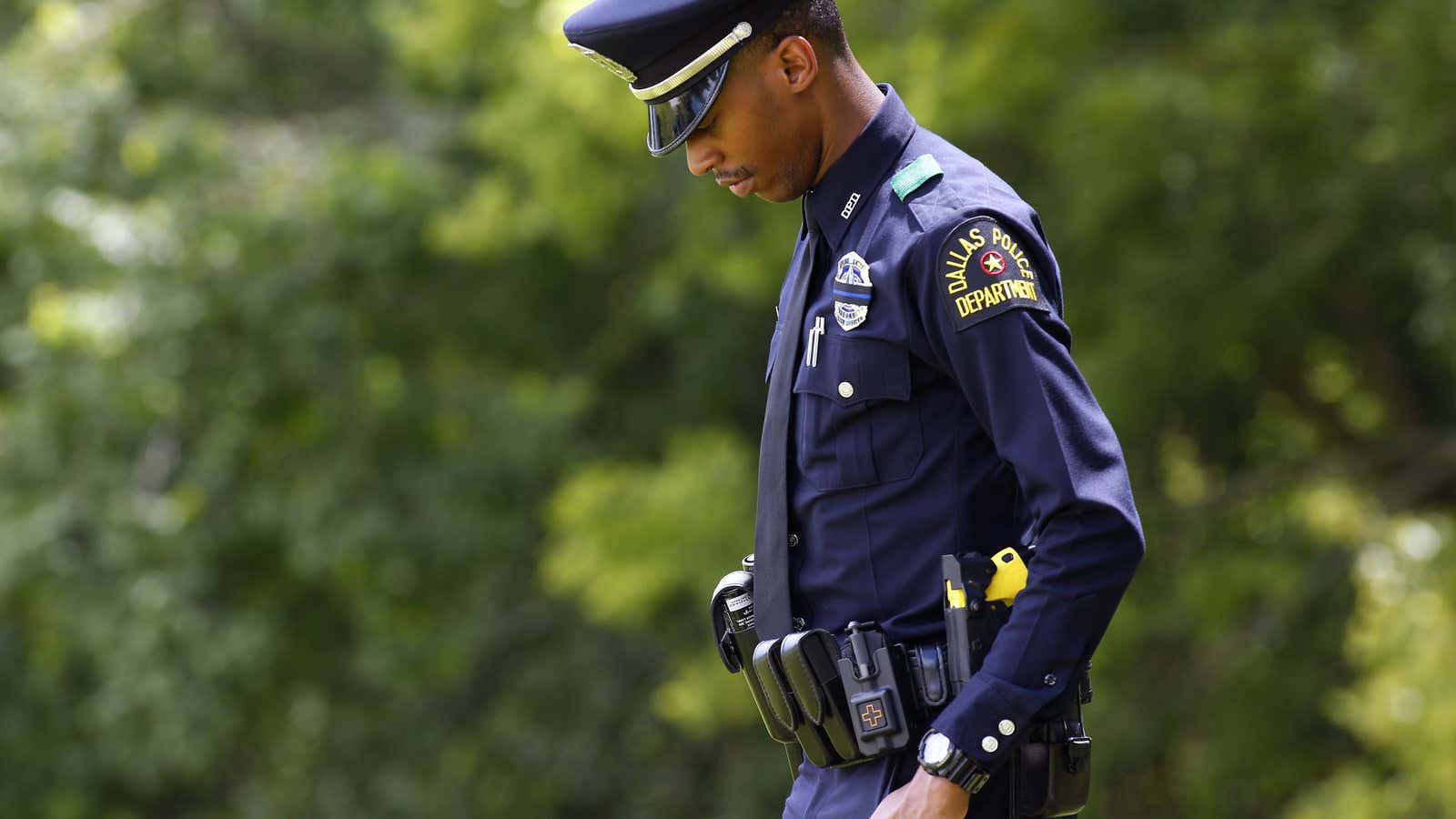After a US army veteran killed five police officers in Dallas last year, the department turned to a new method of dealing with stress on the job: the practice of mindfulness.
Mental-health experts and law-enforcement brass began thinking about how to respond to the attack that traumatized the Dallas force and the city immediately after it unfolded, the Associated Press reports. A philanthropist provided the financial backing for 500 officers to receive mindfulness and cognitive training.
The technique’s goal is to change the way officers manage stress and their emotions, emphasizing a deliberate, thoughtful response—and not a rash reaction. The aims are twofold: to help officers cope with trauma, and to reduce violence. Mindfulness has been gaining steam as an element of US police training in recent years, and is being introduced in departments including Seattle, Washington and Madison, Wisconsin. Research shows that because of the violence, pressure, and demands of the job, police officers have some of the highest levels of stress among all occupations.
Dr. Dan Siegel, clinical professor of psychiatry at the UCLA School of Medicine and founder of the Mindful Awareness Research Center at the university, told Quartz that there are three elements to mindfulness training: focused attention, open awareness — “the broadening of awareness so that there becomes a space between impulse and action”— and kind intention, or compassion.
The exercises include mindful breathing. An article by Barry Yeoman in the magazine “Mindful” recounts a session with officers, complete with the strategies trainers need to use to convince tough, reticent cops to participate:
“It’s not about going to your happy place. This is not la-la lightweight nonsense,” says Don Chartrand, who is visiting a department in Emeryville, California. “I’m serious: This is blood and guts, sometimes life and death.”
“Use your imagination,” he says. “It’ll sound weird. Pay attention to your breath. And imagine that the breath is flowing into your heart through your hand. Deep breaths. It’s a little odd.”
The “Mindful Badge” program, whose creator Richard Goerling is among those leading the Dallas training, describes on its website the benefits as a win for both departments and their communities: “Mindfulness skills training cultivates and sustains resilience and fosters civility among police officers and professional staff within a police agency.”
Meditation has become a near-ubiquitous self-help trend, and research suggests departments shouldn’t discount it as a fad. Siegel says it’s proven to have positive effects on the body and the mind, from improving the immune system and cardiovascular function, to changing the structure of the brain. It helps with attention, memory, behavior, and regulating one’s emotions. In terms of reducing violence, it could lessen impulsivity, widen the options for officers’ actions, and increase empathy and compassion. Researchers even argue mindfulness training could reduce racial bias.
In a stressful situation, it is tougher for the mind to respond and not simply react, explains Matthew Hunsinger, an associate professor of social psychology at Pacific University who studies the effects of mindfulness practice on police officers. “We can think of our mind as kind of muscle in that we can fatigue it,” he says.
Our muscles have a finite amount of energy, which is why you probably shouldn’t attempt a hike after a leg workout. The same applies to the brain, which doesn’t have unlimited energy for the mental activity of self-control or deliberation.
“Because it takes mental energy to observe our thoughts and feelings and not respond to these thoughts and feelings the moment they arise,” Hunsinger says, “being stressed out means our mental energy reserves are smaller and there is less energy to engage in that process.”
Practicing mindfulness could be compared to building muscle strength at the gym, since it increases your mental resources, he says.
A 2015 clinical study published in the Journal of the American Medical Association showed that about half of military veterans who underwent mindfulness training reported a reduction in PTSD symptoms, compared to only a third who participated in a different form of therapy. A small 2016 study by Hunsinger, Goerling, and others of 43 police officers who went through eight weeks of mindfulness training showed improvement in self-reported resilience, stress, emotional intelligence, and sleep, and also reduced feelings of burnout, anger and fatigue.
While mindfulness practices have been around for thousands of years, in various cultural and religious traditions, it’s become the subject of scientific study only in recent decades, with a boom in the past 15 years, Siegel says. Researchers studying its effects on police and veterans say that much more work is needed to fully assess the potential.
